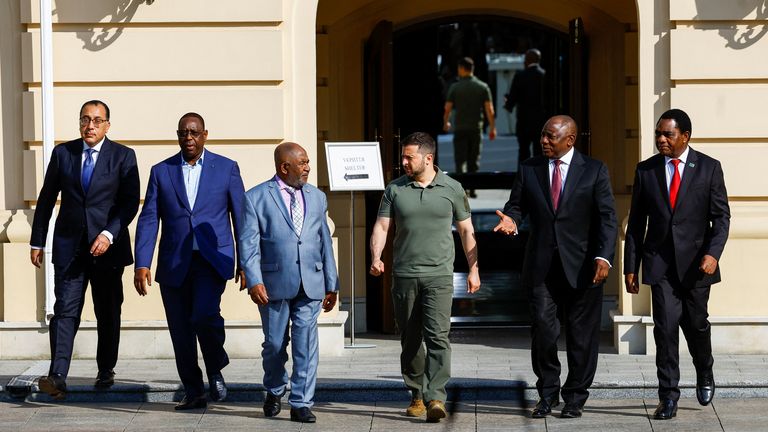In the throes of the ongoing Russia-Ukraine conflict, an unexpected diplomatic narrative has been unfolding: the active involvement of African leaders. The peace mission led by South African President Cyril Ramaphosa, marking the first time African leaders have embarked on such an endeavor beyond their continent, has been hailed as historic. However, the mission's success and the broader implications of Africa's involvement in this conflict are complex and multi-layered.
The African delegation to Ukraine and Russia consisted of leaders and representatives from seven countries: South Africa, Egypt, Senegal, Congo-Brazzaville, Comoros, Zambia, and Uganda. Their mission was spurred by the devastating impact of the conflict on living standards in Africa, particularly the shortage of grain and fertilizer resulting from disrupted trade with Ukraine and Russia.
The delegation proposed a 10-point plan that included the recognition of Russia and Ukraine's sovereignty and a call for unhindered grain exports. They also urged a de-escalation of fighting and an immediate commencement of negotiations, the release of prisoners of war, and increased humanitarian support.
Despite these ambitious attempts to negotiate peace, the African delegation's efforts have been met with lukewarm responses. Both Russia and Ukraine have insisted on specific preconditions before any negotiations, making the realization of peace a complex and thorny process. Although this initial mission did not lead to the desired outcomes, Ramaphosa remains optimistic, arguing that the delegation's efforts have opened doors for future talks.
However, this mission has not been without controversy. Questions have arisen about whether this initiative is truly representative of Africa as a whole or if it is predominantly an effort from South Africa, driven by Ramaphosa's personal political agenda. The South African President has been grappling with economic and political challenges at home, raising suspicions that he might be leveraging this international crisis to gain diplomatic capital on the global stage.
Adding to the complexity is the fact that some African leaders have been accused of supporting Russia due to their economic advantages. In a United Nations General Assembly vote on a resolution demanding Russia stop its military operations in Ukraine, half of the African member states chose a path of neutrality. This stance has been attributed to several factors, including skepticism towards NATO, reliance on Moscow for military support, dependence on wheat and fertilizer imports from Russia and Ukraine, and a perceived lack of Western support during the COVID-19 pandemic. Some African countries even view the conflict as a resurgence of Cold War dynamics, with the US and Russia using other nations as pawns in their geopolitical games.
In conclusion, Africa's involvement in the Russia-Ukraine conflict signifies a shift in global diplomacy. It underscores the continent's emerging role as an active participant in international affairs, not just as a bystander or a recipient of Western aid. The outcomes of this involvement are yet to be determined, but one thing is clear: Africa's diplomatic landscape is undergoing a significant transformation.










Trackbacks and Pingbacks